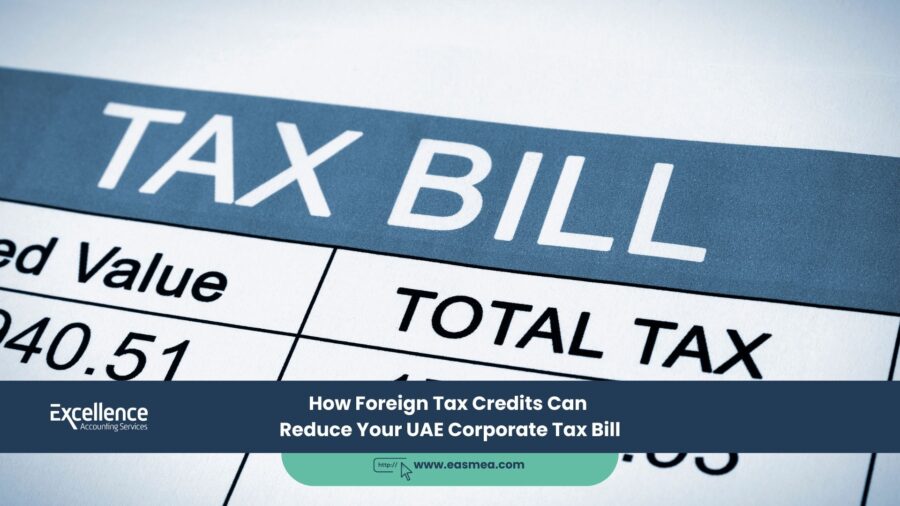How Foreign Tax Credits Can Reduce Your UAE Corporate Tax Bill
As UAE businesses expand their global footprint, they increasingly earn income from outside the country. This international success, however, brings a major tax challenge: **double taxation**. This occurs when the same income is taxed once in the foreign country where it was earned, and again in the UAE, the company’s home country. To prevent this, the UAE Corporate Tax (CT) Law has incorporated a vital relief mechanism known as the **Foreign Tax Credit (FTC)**.
- How Foreign Tax Credits Can Reduce Your UAE Corporate Tax Bill
- How Does the Foreign Tax Credit Work?
- Eligibility and Documentation
- Optimize Your International Tax Position with Excellence Accounting Services (EAS)
- Frequently Asked Questions (FAQs)
- Don't Pay Tax Twice. Optimize Your Global Tax Position.
The FTC is a powerful tool that allows a UAE business to reduce its domestic corporate tax liability by the amount of tax it has already paid to a foreign government on the same income. It is the primary mechanism for mitigating the burden of double taxation and is a cornerstone of international tax policy. For any UAE company with foreign branches, international clients, or overseas investments, understanding and correctly applying for the FTC is essential for efficient tax planning.
This guide will provide a clear explanation of how the Foreign Tax Credit works in the UAE. We will cover the eligibility criteria, the all-important calculation and its limitations, and the documentation you need to successfully claim this valuable credit.
Key Takeaways
- Purpose is to Avoid Double Taxation: The FTC is designed to prevent the same income from being taxed twice—once abroad and once in the UAE.
- It’s a Credit, Not a Deduction: An FTC is a dollar-for-dollar reduction of your final tax bill, making it much more valuable than a tax deduction, which only reduces your taxable income.
- The “Lesser Of” Rule: The credit you can claim is limited to the **lesser of** the actual foreign tax paid or the UAE corporate tax due on that same foreign income.
- No Carry Forward for Excess Credits: If you pay more tax in a foreign country (e.g., 15%) than you owe in the UAE (9%), the excess credit (6%) is lost. It cannot be refunded or carried forward.
- Strict Documentation is Required: To claim the FTC, you must have official proof of the foreign tax paid, such as tax receipts or withholding tax certificates. Expert corporate tax advice is crucial for compliance.
How Does the Foreign Tax Credit Work?
The principle of the FTC is straightforward. When a UAE resident company earns income from another country and pays tax on that income to the foreign government, the UAE allows the company to subtract that foreign tax payment from its UAE corporate tax bill.
For example, if your UAE company owes AED 100,000 in corporate tax but can prove it has already paid AED 30,000 to a foreign government on part of that income, your final tax payment to the Federal Tax Authority (FTA) would be reduced to AED 70,000.
The All-Important Limitation: The FTC Cap
The most critical rule to understand is that the credit is capped. You can only claim a credit up to the amount of UAE corporate tax that would be due on that foreign income. You cannot use a high foreign tax to reduce your tax on your UAE-sourced income.
The FTC is the lower of:
- The actual amount of foreign tax paid.
- The UAE corporate tax payable on the relevant foreign income.
Example Calculation:
A UAE-based consulting firm earns AED 1,000,000 in service fees from a client in Country X. Country X imposes a 15% withholding tax on these services.
- Foreign Income: AED 1,000,000
- Foreign Tax Paid: 15% of AED 1,000,000 = **AED 150,000**
- UAE Corporate Tax Due on that income: 9% of AED 1,000,000 = **AED 90,000**
Now, we apply the “lesser of” rule:
- The lesser of AED 150,000 (foreign tax paid) and AED 90,000 (UAE tax due) is **AED 90,000**.
Result: The company can claim an FTC of AED 90,000, which completely eliminates the UAE tax on that foreign income. However, the excess AED 60,000 (150,000 – 90,000) that was paid in Country X is lost. It cannot be used to offset tax on other income, nor can it be carried forward.
Eligibility and Documentation
To successfully claim the FTC, a business must meet certain conditions and maintain meticulous records.
- Eligible Taxes: The foreign tax must be a corporate income tax or a tax of a similar character (like a withholding tax on profits, interest, or royalties). Consumption taxes like VAT or sales tax are not eligible.
- Proof of Payment: You must have clear evidence that the foreign tax was paid. This includes official tax receipts, withholding tax certificates issued by the foreign tax authority, or the filed foreign tax return.
- Income Must be Taxable in UAE: You cannot claim a credit on foreign income that is exempt from UAE corporate tax (for example, dividends that qualify for the Participation Exemption).
Optimize Your International Tax Position with Excellence Accounting Services (EAS)
Navigating the interaction between UAE law and foreign tax systems requires specialized expertise. The team at EAS provides comprehensive tax advisory services to ensure you minimize your global tax burden while remaining fully compliant.
- Expert Corporate Tax Advisory: We provide clear guidance on the FTC rules, helping you determine your eligibility and calculate the maximum credit you can claim.
- International Tax Structuring: We advise on how to structure your international operations and transactions to be as tax-efficient as possible, taking into account Double Taxation Avoidance Agreements (DTAAs) and FTC limitations.
- Compliance and Filing: We manage the preparation of your UAE corporate tax return, ensuring that your FTC is correctly calculated, claimed, and supported by the required documentation.
- Strategic CFO Services: Our outsourced CFOs can help with long-term planning, modeling the tax impact of expanding into new countries and managing global cash flow.
Frequently Asked Questions (FAQs)
A tax credit is much more valuable. A credit reduces your final tax bill on a dollar-for-dollar basis. A deduction only reduces your taxable income, so its value is the amount of the deduction multiplied by your tax rate. An AED 100 credit saves you AED 100 in tax; an AED 100 deduction saves you AED 9 in tax (at a 9% rate).
This is a favorable scenario. If you earn AED 100,000 in a country with a 5% tax rate, you would pay AED 5,000 in foreign tax. The UAE tax due would be AED 9,000. You can claim the full AED 5,000 as a credit and would only need to pay the remaining AED 4,000 to the FTA.
The UAE has an extensive network of DTAAs. These treaties often reduce the rate of withholding tax that the foreign country can charge on payments to a UAE company. This can reduce the amount of “wasted” foreign tax credit. For example, a treaty might reduce a 15% withholding tax to 5%, which is fully creditable against the UAE’s 9% rate.
Yes. If your UAE company has a branch in another country, that branch is a “permanent establishment.” The profits of that branch are subject to tax in the foreign country and are also included in your taxable income in the UAE. You can claim an FTC for the corporate tax paid by the branch, subject to the usual limitations.
No. The UAE applies the FTC limitation on a country-by-country and item-by-item basis. You cannot use excess tax credits from a high-tax country (e.g., Germany at 30%) to offset the UAE tax due on income from a low-tax country (e.g., Ireland at 12.5%).
If your company has an overall tax loss in the UAE for a given year, you will not have any corporate tax liability. Therefore, you cannot claim any Foreign Tax Credits for that year, as there is no UAE tax to offset. The credits for that year are lost.
You must convert the foreign income and the foreign tax paid into AED using a consistent and recognized exchange rate, typically the rate applicable at the time the income was accrued or the tax was paid.
If you receive a refund of foreign tax for which you previously claimed a credit, you must notify the FTA and amend your UAE tax return for that prior year. This will likely result in additional UAE tax being payable.
Yes. The rules apply to all “Taxable Persons.” If an individual is subject to UAE Corporate Tax (e.g., because their business turnover exceeds AED 1 million), they can claim an FTC for foreign taxes paid on their taxable business income.
No, it is a relief that you can elect to claim. However, there is no commercial reason not to claim it if you are eligible, as it directly reduces your tax payment.
Conclusion: An Essential Tool for International Business
The Foreign Tax Credit is a vital provision in the UAE Corporate Tax law that supports the global ambitions of local businesses. By preventing the erosion of profits through double taxation, it encourages international trade and investment. However, leveraging this credit effectively requires a thorough understanding of the rules, meticulous record-keeping, and strategic planning. For any UAE business operating on the world stage, mastering the FTC is a key component of a sound international tax strategy.
Don't Pay Tax Twice. Optimize Your Global Tax Position.
Contact Excellence Accounting Services for expert guidance on international tax planning and compliance.




